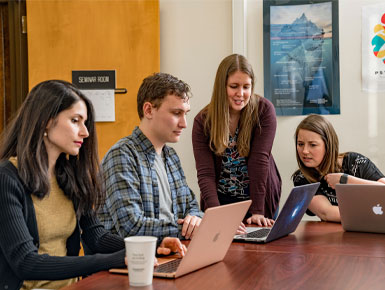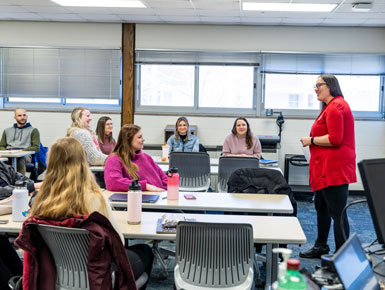USD Helps Meet Demand for Mental Health Services in the Region

According to the National Alliance on Mental Illness, 112,000 adults in South Dakota have a mental health condition—more than eight times the population of the state capital city of Pierre. Meeting the needs of these individuals has proved challenging. South Dakota ranks 40th among U.S. states in terms of access to mental health care, says Mental Health America, a nonprofit dedicated to addressing the needs of those living with mental illness.
With undergraduate and graduate training in a variety of disciplines, USD has a substantial record of preparing mental health providers to serve our state. These professionals offer substance abuse addiction care, case management, individual therapy and testing, and evaluation services. Their work touches every corner of South Dakota, with increasing emphasis on communities with the most need.
The state’s flagship university is home to faculty from a range of programs who are preparing the next generation of professionals in mental health care.
Social Workers Serve Communities’ Complex Needs
At USD, students who graduate with a degree in social work are trained to take a systems-level approach to mental health that includes providing therapy to individuals while addressing the broader issues of societal and community stressors, said Kelly Bass, Ph.D., chair and associate professor of social work.
As the only university in the state to offer a Master of Social Work (MSW) degree, USD graduates professionals who are able to provide much-needed therapy services and may also work to address issues such as poverty and homelessness, foster collaboration among community organizations and seek to enact change at a structural level.
These crucial contributors to a community’s mental health are particularly needed in regions of South Dakota that lack access to support services due to low population density, low socioeconomic status or both. Graduating students who will effectively meet the social services needs of the citizens of the state and region is one of the guiding principles of the USD social work program.
“We have a responsibility as a department to provide our students with a program so that they're prepared as quickly as possible to get out there and work with the most vulnerable populations,” Bass said.
Bass practices what he preaches. In addition to serving as chair of his department and program director of the MSW program at USD, he continues to engage in clinical and supervisory practice throughout South Dakota, providing mental health treatment to at-risk youth, families and adults who are involved in the social services and court system.
Bass sees coordination of mental health services across specialties as a way to serve community needs efficiently and effectively while also curbing provider burnout.
“We can take a team-collaborator approach where we combine professionals who have mental health as their specialty,” he said. “Working through this team approach can reduce stress and burnout and allows the ability to do a wraparound approach to a client’s needs.The social work department is focused on not only providing the best education, but also on ensuring that education is accessible to professionals who are already committed to living in and serving their communities.
To support those place-bound students, the social work department actively pursues grants and funding from public and private sources, which enables them to offer stipends and scholarships to help individuals who already work in human services roles to advance their education.
“We have professionals in the field right now who don't want to leave their communities,” said Bass. “But we also have a group of students that really like that on-campus setting. We're trying to meet the needs of those two different types of demographics.”
Brittany O’Day earned her MSW from USD in 2020 through the online program. Now an FBI victim specialist working in the resident agency of the FBI's Minneapolis Division in Aberdeen, South Dakota, O'Day was able to further her training and remain in her community while earning her advanced degree. Her office covers northern South Dakota and tribal regions, including the Standing Rock and Sisseton Wahpeton reservations.
O’Day said the USD MSW program provided her with the framework to assist individuals and communities. “With my work as a victim specialist on the reservation, it is important to understand the environment, resources and the history,” she said. “The MSW program helped me prepare and become creative with limited resources and how best to work with different populations. It also assisted me in engaging stakeholders on community needs and providing education to the communities I serve.”
Providing Substance Abuse Treatment and Prevention
“The opposite of addiction isn’t sobriety, it’s support.”
These are the words Melissa Dittberner, Ph.D., a lecturer in the Department of Addiction Counseling and Prevention, uses to describe her guiding philosophy for serving people with addictions.
It’s a philosophy that also governs a new program Dittberner and colleagues developed to provide support for those in need of addiction services. The program, Straight Up Care, recently received a grant to train and certify peer specialists who will support people in recovery via a telehealth app.
The goal of the program, according to Dittberner, is for peer specialists to be able to reach clients remotely. These specialists will be in recovery from addiction or have a loved one who they have helped in recovery.
“My past research has shown that peer services are needed across the state,” she added. “These grants will help boost the workforce for people in recovery.”
Improving access to addiction services in South Dakota can help stem a crisis that has only worsened due to the COVID-19 pandemic. According to the Kaiser Family Foundation, South Dakota’s drug overdose death rates have increased from 7.1 per 100,000 in 2011 to 12.6 per 100,000 in 2021.
USD offers a certificate, bachelor’s degree and master’s degree in addiction counseling and prevention in which students learn the nature, prevention and treatment of substance-use disorders. After graduating, students can earn credentials to work in the field through the South Dakota Board of Addiction and Prevention Professionals.
Dittberner said her students are prepared to counsel individuals struggling with addiction as well as provide prevention services to schools and communities. As someone in recovery herself, Dittberner often talks about her own experiences.
“As a person who did drugs at a very young age, I put myself in this position to go out and educate young people about what drug use really looks like,” she said.
Her students also learn to advocate for greater services on a state and national level to treat and prevent substance abuse. “We talk about fundraising, we talk about grant funding, we talk about how to build a prevention project, how to sell it, what it looks like to just build it from the bottom up,” she said.
Dittberner added, “I tell my students that your voice matters. You have power and you can make things happen. You have to use your voice.”
Expanding Evidence-Based Treatment for the Underserved
Jean Caraway, Ph.D., has taught, researched and provided psychological services in the rural Midwest for more than 25 years. As a past president of the South Dakota Psychological Association, she has first-hand knowledge about staffing shortages affecting psychological care in the state.
“I know of psychologists in West River who have thriving private practices, and they are having trouble retiring as they can’t get someone to move in and take over their client load,” said the USD professor of psychology.
Caraway also recently amassed a trove of data on the need for more psychological services in the state when she and colleague Beth Boyd, Ph.D., applied to and were awarded a federal grant to train doctoral health service psychology students. Their work focused on equipping students to provide quality behavioral health services in community-based primary care settings in high-need and high-demand areas throughout South Dakota.
One stand-out data point: Only 5 of 66 counties in South Dakota do not represent a mental health shortage area (based on the federal government’s Health Resources and Services Administration criteria). Of the 66 counties in the state, 10 counties are considered shortage areas of mental health care by population and 50 counties are considered geographic shortage areas.
With grant funding from the U.S. Department of Health and Human Services and the Health Resources and Services Administration, USD’s psychology department formed the new graduate psychology education program. Through the program, USD will prepare their psychology graduate students to provide culturally responsive behavioral health services where these services are lacking—in rural, underserved and Native American populations.
The program also prepares graduates to work in primary care settings, where they can reach more people who may not seek out behavioral health care or perhaps don’t realize they need help.
“In rural areas, the number one place people go when they have a health problem is a primary care setting,” said Caraway. If a patient demonstrates a need for mental health services—for example, through a screening questionnaire for depression or anxiety symptoms—a psychologist on-site means assessment and treatment can start right away. “With a clinical psychologist available, there can be a warm hand-off to someone who can help the patient,” she added.
Caraway also emphasized the training model of students in USD’s graduate psychology program.
“Even though there are other models of training for clinical psychologists nationwide, one of the most prevalent is what we do at USD—our clinical psychologists are ‘scientist-practitioners,’” she said.
Clinical psychologists with a degree from USD engage in evidence-based practice, in which their professional practice is based on solid, up-to-date research. “Practitioners use those diagnostic and therapeutic practices that the scientific evidence shows fits most effectively with a certain population or a person in their office,” Caraway said.
Evidence-based practice is the gold standard in providing effective mental health care, but national data show only 30% of mental health provision is evidence based, Caraway said.
“Evidence-based services can deliver the most effective interventions and hopefully decreases the number of sessions someone may need to get relief,” she added.
Serving Youth with School-Based Mental Health Care
USD is also training the professionals who serve the state’s youth where they spend the majority of their productive time—in an educational setting.
“One in five children have a diagnosable mental health disorder. And of those kids who receive services, approximately 75% to 80% of them receive those services at school,” said Kari Oyen, Ph.D., LP, NCSP, program director and associate professor of school psychology at USD.
The graduate program in school psychology offers two degrees—Education Specialist and Doctor of Philosophy—to individuals who support student success academically, socially, emotionally and behaviorally.
“The best way I describe school psychology is that we’re the psychologists who know the most about education and we’re the educators who know the most about psychology,” Oyen said.
School psychologists are a critical part of the team that fosters a student’s success.
“A lot of people don’t know about the profession,” Oyen said. “I have always felt like we are detectives who analyze problems and are real problem solvers.”
School psychologists perform assessments, design behavior intervention plans and assist with developing academic intervention plans. They also support teachers with guidance and information on topics such as ADHD and autism. There is a critical shortage of school psychologists in South Dakota and across the nation.
Oyen, who worked as a rural school psychologist in the Lennox School District for 10 years and a consultant with the South Dakota Department of Special Education before becoming a professor at USD, said early behavioral and mental health intervention in the school setting can head off problems that may otherwise lead to poor outcomes for kids.
“We need to teach things like reading, writing and math, but we also need to make sure students know how to cope with the everyday demands of the home and school environment," Oyen said. “Having mental health professionals as school employees—right there where kids are—can be such a powerful support.”Hser Lar Kpaw Htoo is one of the graduate students in the school psychology program who wants to make a positive impact on students’ lives.
Htoo relocated to the U.S. from a refugee camp in Thailand after fleeing from ethnic conflict and civil war in his home country of Myanmar. During his middle- and high-school years in St. Paul, Minnesota, he witnessed the ability of school psychologists to offer assessment, guidance and support.
“Struggles like poor academic performance and a language barrier hindered my ability to reach my full potential,” Htoo said. “Nevertheless, with the aid of school psychologists and other educators, I received the necessary support that allowed me to catch up with my classmates and improve my English language proficiency, ultimately fostering a sense of belonging in the classroom.”
Htoo’s dedication to making a difference in the field of school psychology resulted in him being selected as a recipient of the National Association of School Psychologists (NASP)-ERT Minority Scholarship, a highly competitive scholarship aimed at supporting the graduate training of minority students who are pursuing careers in school psychology. Htoo was one of only six students in the nation selected for the program.
Oyen – along with Assistant Professor Miranda Zahn, Ph.D., and Assistant Professor Kate Helbig, Ph.D., BCBA-D – were recently awarded a grant from the Department of Education that will give the USD Division of Counseling & Psychology in Education the opportunity to train more school psychologists like Htoo.
The U.S. Department of Education awarded the USD School of Education $3 million to increase the number of school mental health providers in high-need areas of the state. Over the next five years, grant funds will allow the school to provide financial assistance to graduate students in the program, enhance training and offer comprehensive practicum and internship placements. With the grant, USD aims to produce 12 new highly trained school psychologists who will work for a minimum of three years in a comprehensive school mental health role.
The grant includes partnering with educational service agencies and school districts, encompassing 117 schools and nearly 32,000 students.
“The school psychology program is honored to serve South Dakota in this way and find innovative ways to homegrow school psychologists where they are needed the most,” said Oyen.
Adequate Staffing Prevents Burnout
In all of the disciplines that train mental health care providers at USD, faculty members acknowledged that providers could face burnout and compassion fatigue. That’s why each program builds in lessons on resiliency and self-care within their curriculum.
The best way to combat burnout, however, is to have enough providers to support a community’s mental health needs.
“In an academic setting, we have idealistic curriculum for our students,” said Bass. “But the idealistic curriculum doesn't currently match up to what is happening day to day for therapists in the field. You can take care of yourself, have boundaries, communicate your needs and have support systems around you. But what has to be addressed at the organizational level is the size of the caseloads.”
USD has taken on the job of preparing mental health professionals who can fill positions throughout the state. The grants earned from federal and other sources underscore the value and experience of USD faculty members and programs in clinical psychology, school psychology, social work, and addiction counseling and prevention.
Retaining these professionals is just as important as recruiting and training, said Oyen. Creating a culture of support for mental health providers is essential.
“In our program, we not only teach you the core competencies related to school psychology, but also the self-care strategies to ensure that a school psychologist can stay in this career long-term,” Oyen said. “We know that research tells us when we invest in retention strategies that align with our NASP practice model, we ensure that working conditions and caseloads are adequate and school psychologists are empowered to meet the needs of the children they serve.”
Oyen and her colleagues across the university keep in touch and support each other in their efforts to improve mental health care in the state. “We’re all on the same train and we’re going in the same direction. When one of us is successful, it helps us all,” she said. “I'm real proud of that. And heck, I'd want to be trained at USD.”


